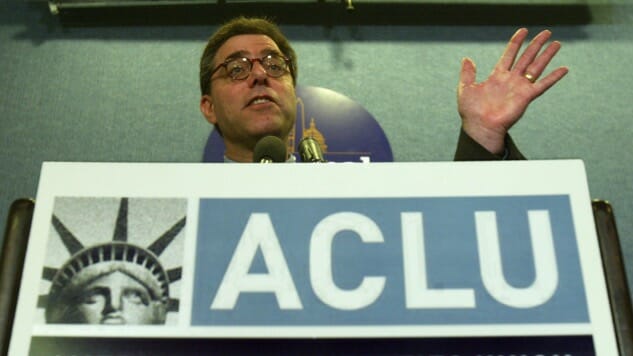Maybe This is a Bad Time but the ACLU Really Blew It on Campaign Finance
Photo by Alex Wong
Last Wednesday, the United Talent Agency, home to A-listers like Harrison Ford, Angelina Jolie, and Amy Schumer, announced it was cancelling its long-awaited Oscars party and instead donating $250,000 to the American Civil Liberties Union (ACLU). The action was meant as a symbol of resistance against President Donald J. Trump.
By now, everyone is aware of the special place the ACLU holds in the hearts of people on the left. According to The Washington Post, after President Donald Trump’s victory in November, the ACLU has received over $15 million. This groundswell of support continued following his first week in office, during which he signed several controversial executive orders, including new travel restrictions on individuals entering the United States from seven predominantly Muslim countries, for which the ACLU filed a lawsuit against the administration. All told, this past weekend, the civil rights group received over $24 million, which, as The Post reports, is over six times its yearly average.
It makes sense too. Donald Trump has not exactly inspired confidence that he will not single out minority groups in his effort to rally voters, and the ACLU’s reputation for protecting disenfranchised peoples precedes it. It was just a few short years ago, in 2013, when the group took on the National Security Agency (NSA) over the latter’s “unconstitutional” domestic spying program involving the collection of Americans’ phone metadata. The left cheered, as it is doing once again.
But something now needs examination in light of the fact hundreds of thousands of people are looking for groups which will fight on the front lines and #resist Trump: the role the ACLU played in creating the conditions that led to the President’s election—namely an unresponsive government beholden to economic elites.
The ACLU has been a key and consistent player in the dismantling of the federal regulatory framework for campaign finance. It has been a party on the winning side in both the 1976 case of Buckley v. Valeo and the 2010 case, Citizens United v. FEC which respectively established the controversial principles that spending money is a protected form of speech and that corporations and unions were entitled to the same speech rights as private citizens.
Since these decisions, the influence of money in our political system has grown significantly, with congressmen dedicating virtually half of their time fundraising. A nonpartisan study from 2014 of the past four decades since Buckley found that policy outcomes are driven by the demands of the economic elite rather than popular will. Critics have criticized the methodology of that study, only to find that their own research confirms the overall premise that the US has become an oligarchy. The demands of the elites outweigh the will of the people.
And in our oligarchy, money is not only incredibly influential, but also incredibly difficult to trace. Thanks to Citizens United, even foreign governments can get in on the action by using dummy corporations. An example of how this becomes a real problem for transparency is when said dummy corporation is a 501©(4) nonprofit, a type of nonprofit able to keep its donors hidden. These corporations can also hire federally registered lobbyists, which mandates disclosure. Of course, anyone really bent on circumventing that disclosure requirement can retain de facto lobbyists who take advantage of the Daschle Loophole, thus falling just shy of the legal definition of what a lobbyist is. All told, our campaign finance laws are now so porous there is no way of knowing how much money foreign governments spend in our elections thanks to that fateful 2010 Supreme Court decision.